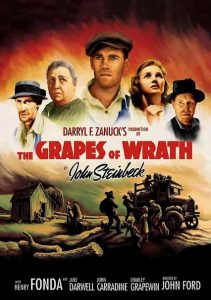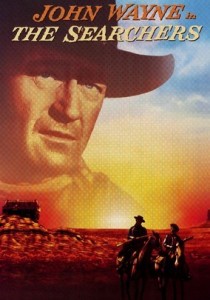My Darling Clementine-1946
Director John Ford
Starring Henry Fonda, Victor Mature
Scott’s Review #1,017
Reviewed April 30, 2020
Grade: A-
Esteemed director John Ford, mostly known for crafting the very best in the Western genre for four decades, creates a timeless story that is character-driven and unpredictable.
My Darling Clementine (1946) provides a superb atmosphere amid a depressing ambiance led by Henry Fonda, the appealing leading man of the day. The iconic American Western folk ballad, “Oh My Darling, Clementine,” appears during the opening and closing credits to bookend the classic.
In 1882, events began when a group of men herded cattle through the Old West en route to California. The Earp brothers (Wyatt, Morgan, Virgil, and James) encountered the sinister Clanton family, who salivated over the profit the animals could supply them.
After being rebuffed for a sale, the Clantons kill young James and steal the cattle. Wyatt (Fonda) vows revenge and settles in at Tombstone, Arizona, where he befriends the dangerous Doc Holliday (Victor Mature), Clementine Carter (Cathy Downs), the ravishing Chihuahua (Linda Darnell), and Mac, the local bartender.
The film is based on real-life Western figures and events. Wyatt Earp was a lawman and gambler, while Doc Holliday was a gambler, gunslinger, and dentist. Both men participate in the famous and bloody gunfight at the OK Corral, the thirty-second shootout between law enforcement officers and outlaws, regarded as the most well-known battle in the American Wild West.
This makes the film both historical and fun for viewers anticipating some truth. The rest is a created story.
During My Darling Clementine, one can delve into other avenues of enjoyment besides the action on screen. The rich surroundings are glorious and plentiful.
Much of the action takes place outdoors, which is a treat. The spacious and wide-open exteriors are a marvel to watch. The exquisite clouds and sprawling lands are evident, as is the black-and-white cinematography, which adds a measure that color film would have ruined.
Unlike other Westerns, there is surprisingly little racism to be found. Commonly, American Indians are classified as the enemy and subsequently mistreated. Other than one quick scene where an unnamed Indian is booted out of town, a racist moment can be found.
Quite a few Mexican characters appear, most prominently Chihuahua, the apple of every man’s eye. To see Mexican culture represented and celebrated with dancing and country colors is a nice addition.
The pacing is also superior, with little lag or drag time. The short running time of one hour and thirty-six minutes is beneficial, as events get dirty quickly. The saloon scenes, which are simply a must in this genre, are excellent, with their combustible energy.
So much transpires within each scene as the patrons eat, drink, dance, sing, and fight. Interesting characters like the bartender and Granville Thorndyke, a stage actor who performs Shakespeare, make the film very fleshed out from a character perspective.
A minor demerit that must be aimed at the film is the awkward decision to write a perplexing ending that sours the wrap-up. When the big shootout concludes, Wyatt decides to depart Tombstone, bidding adieu to a confused Clementine at the schoolhouse, wistfully promising that he will look her up if he returns.
This is weak and unsatisfying, considering she moved to the West from the East to be with Doc, who dies. Why would she decide to stay, and why would he leave, considering the pair were drawn to each other as the film escalated? I was expecting a “happily ever after” moment.
My Darling Clementine (1946) is an elite treasure in a genre that is commonly one-note and riddled with stereotypes and inadequate treatment of those who are not white, masculine men. Sure, the whiskey flows heavily as the guns are cocked and loaded at a moment’s notice.
But, with arguably two main heroes (Wyatt and Doc), well-crafted supporting characters, and a stoic final fight, this film has it all, providing depth and freshness to an often-stale cinematic genre.


